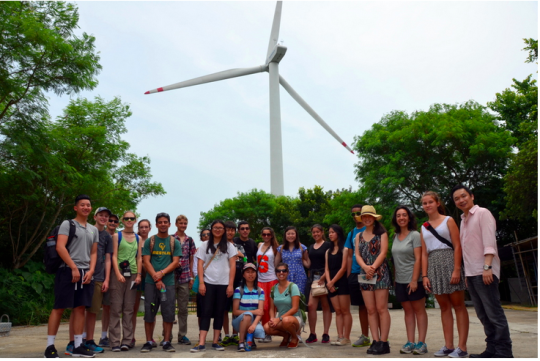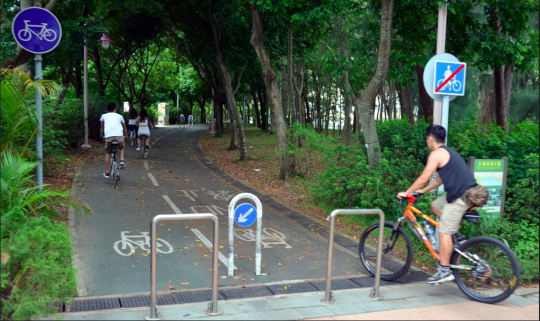by Paola Alvarado, ECO2school Program Coordinator | 8/31/2015
One of our very own
team members, Paola Alvarado, was granted the opportunity through a partnership
between Volunteers in Asia and the U.S State Department of Education and
Cultural Affairs to chaperone a group of 17 vibrant young students as they
explored Hong Kong and Guangzhou China on an environmental education trip.
Please enjoy her reflection.
I stepped out of the plane and was immediately greeted by
miles of skyscrapers. Despite having seen pictures of Hong Kong, I was not
ready for the massive beauty that painted the night sky, with twinkling lights
that made me feel like I was in the midst of the movie, The Matrix. I was here
to learn about urban sustainability while immersing myself in a new culture and
exploring a part of the world I never thought possible. As I looked around at
the jaw-dropping views of the city, I thought to myself “how could this
international port ever coexist with nature?”

Caption: Hong Kong
Skyline
Seventeen high school students from all across the Bay Area
were carefully selected from over 200 applicants to explore environmental
issues in China. Two of the seventeen students were from our ECO2school program.
These teenagers had deep and sincere interest in environmental issues, having
each built their own impressive resumes prior to this trip. And I was lucky
enough to have been selected to accompany these inspiring students as a
chaperone. As the journey began, I was immediately blown away by their
enthusiasm, curiosity, and drive.

Caption: AYLP in Lamma
As the days progressed, together we learned about various
environmental issues facing cities around the world and how China is addressing
these issues. Non-Governmental Organizations (NGO’s) in China opened their
doors to our group and shared their vision for a more sustainable China.
Working with students on transportation projects across
Sonoma County, I was curious to see how these issues where being addressed in
China. Building sustainability around transportation was a theme that continually
captured my attention. In China, transportation is being addressed both by
government agencies and NGO’s.

Caption: Two ECO2school
leaders on an AYLP excursion in China
As a group, we learned about the efforts that cities in
China are making to restructure neighborhoods to make them more pedestrian
friendly, encouraging people to walk and bike. For example, the city of Tai Po
has invested in miles of bike lanes that are heavily used by locals and draw
bike enthusiast to the area. The city of Guangzhou, home to 17 million people,
developed a Bus Rapid Transit (BRT) system, which utilizes different strategies
to quickly navigate the city. Given the fact that air pollution has been a
rising concern in China, creating accessibility to alternative modes of
transportation has had multiple positive impacts. By creating a faster and more
dependable system, people are more comfortable relying on public transit as a
mode of transportation, which in turn, reduces congestion and CO2
emissions.

Caption: Bike Lanes in
Tai Po
Chinese NGO’s have been instrumental in building support for
better transportation systems and environmental causes. They have led advocacy
efforts for infrastructure that supports safe walking and biking while
educating the public about important issues. And they are highlighting the fact
that as cities expand and demand more resources, once-sustainable practices are
causing irreversible damage that must be addressed. However, NGO’s are also
viewed as organizations that threaten the peace and order of the government by
bringing attention to flaws in the system. Therefore, working for an NGO is
seen as a risk in China.

Caption: WWF, one of
the many NGO’s working to create change
Additionally, we learned that China has the ability to
create massive change in the immediate future. Every five years, the People’s
Republic of China releases a Five-Year Plan for National Development that
outlines the goals of the country. The Plan determines how the government will
operate, influencing business practices both nationally and internationally.
The next Plan will outline goals for 2016-20 and its emphasis on environmental
sustainability will either create a positive or a negative impact on China’s
shift towards a green economy. Due to the advocacy work of brave individuals
within NGO’s, reports on the matter indicate that the 13th Five-Year
Plan for National Development will most likely have a positive influence on the
green economy and support the efforts of environmental NGO’s.
Overall, China was a whirlwind of daily educational
adventure and explorations that have forever changed my view of the world.
Today I feel more hopeful about our human abilities to tackle the issue of
climate change. Witnessing the efforts of our counterparts to shift
perspectives and collaborate with one another to implement change has left a
long lasting impression on me about the influence of collective power. I have known for a long time that my
individual actions make a difference. Connecting with people across the globe who
also share a passion and a vision for a sustainable future strengthens my
desire to continue to create change in our community.
“The future belongs to those who believe in the beauty of
their dreams.” Eleanor Roosevelt
Additional blogs and videos from the trip can be found here.